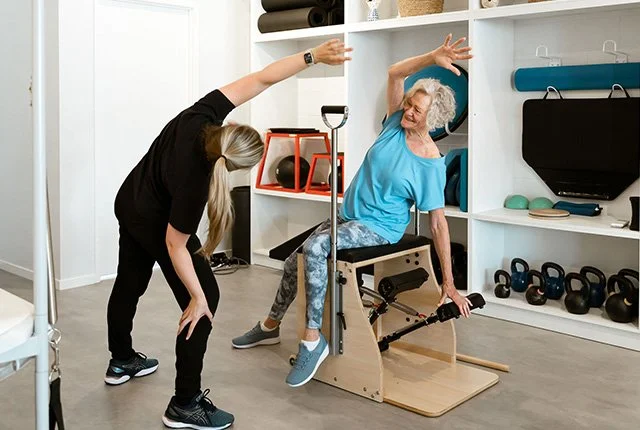5 reasons to see a Physio or Exercise Physiologist who teaches Pilates
At Embody Movement, we believe that Pilates can be helpful for every person in our community. But the key to getting the best results is understanding your body and being aware of your movement.
As Physiotherapists and Exercise Physiologists who also teach Pilates, we understand the human body. We also appreciate the difficulties that people of all ages face in moving in the best way possible.
Physiotherapists and Exercise Physiologists have a thorough knowledge of anatomy, movement, injury diagnosis and treatment. We can observe the way you move, assess how mobility can be improved and identify muscles you need to strengthen.
Climb stairs, play with the kids and move easier
Treatment that results in improvements in movement and activity participation are the most valuable. There is no point in working on greater knee mobility unless that translates into a real-life activity like climbing stairs, getting into a car, or getting down on the floor to play with the grandkids.
Physiotherapy and Pilates complement each other, working together to manage and treat pain effectively, build strength and hasten recovery. If you’re looking for a physio or Pilates instructor, we recommend working with someone who has qualifications in both fields for optimum results.
We explore the main reasons why you should see a Physio who also teaches Pilates.
1. Build on work completed in Physio sessions
Working with a physio who also teaches Pilates means physio treatment can be optimised with Pilates exercises, allowing us to observe movement habits over an extended period. An hour class with a broader range of activities is more useful for observation than ten reps in the treatment room!
We can also integrate the two methods for your benefit, using exercise and movement as part of your treatment. Applying the advice and guidance received in a Physio session to your Pilates classes helps enhance body awareness, improve tolerance to movement (reduce fear of moving when in pain) and build better habits (such as better breathing).
2. Movement tailored for you
Physiotherapy and Pilates require an investment of your time and money. So you want it to be beneficial for your individual needs. Our focus is on your specific goals. We focus on supporting you to accomplish whatever improvement you are looking for, whether it’s becoming more steady on your feet, reducing pain, improving your ability to run or play sport, or feel less stiff.
Practising Pilates allows physio patients to commence exercise quickly as the springs support movement. Focused, customised exercises using Pilates equipment increases the variety of movement you can undertake after treatment or injury. Many of these supported exercises are challenging to replicate at home.
3. Prevent injury or re-injry
A physiotherapist who has worked with you to treat an injury or pain will be aware of your triggers and weaknesses, reducing the risk of aggravating injuries or issues. A key aspect of prevention is the correct progression of loading to avoid aggravation when exercising. Ultimately, the combination of physio and Pilates should gradually strengthen to improve coordination and reduce the risk of reinjury.
Your physio and Pilates instructor takes an active interest in your overall wellbeing. We support you in building strength, increasing stability, and improving overall health, which minimises falls and your chances of developing chronic conditions.
4. Integrity of movement
One of the core principles of Pilates is precision, achieved through moving with intention. A Pilates instructor who is also a physiotherapist can look out for issues or problems that arise which may be more effectively treated with a physio session.
Your instructor can also provide advice if pain is preventing movement. Physiotherapists understand how tissue heals, what movements to avoid initially, what movements will be helpful and how quickly to progress a client. We work with clients with very little mobility (such as after a stroke or surgery) to high performance athletes and have many years of experience providing integrated treatment.
5. More effective at-home exercises
Physios who also teach Pilates have a more extensive catalogue of exercises for treatment and rehabilitation. Even if you don’t attend Pilates classes and physio sessions, you benefit from a deeper level of knowledge and a wider variety of home exercises for rehab and treatment.
Sharing our knowledge with you builds confidence in what to do outside of the studio and enables you to participate in your recovery or journey proactively. We can provide the tools, but the best results are achieved through dedication, commitment and consistent participation. The results that we see in so many of our clients is a joy to witness.
Pilates at Embody Movement
All Pilates instructors at Embody Movement are fully qualified Physiotherapists or Exercise Physiologists. This holistic training provides a more integrated approach to treatment for all patients and can help you achieve your goals faster and prevent injury or pain recurrence.
Keen to get started? Check out our class timetable to see if there’s a class that suits you.
Originally published 7 September 2021. Revised and updated 10 March 2024.

